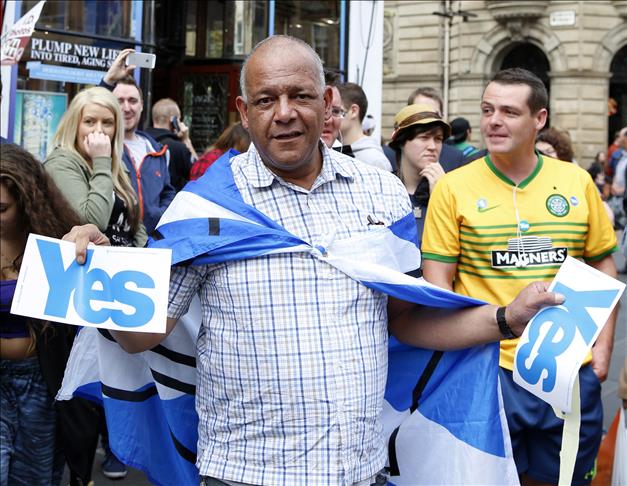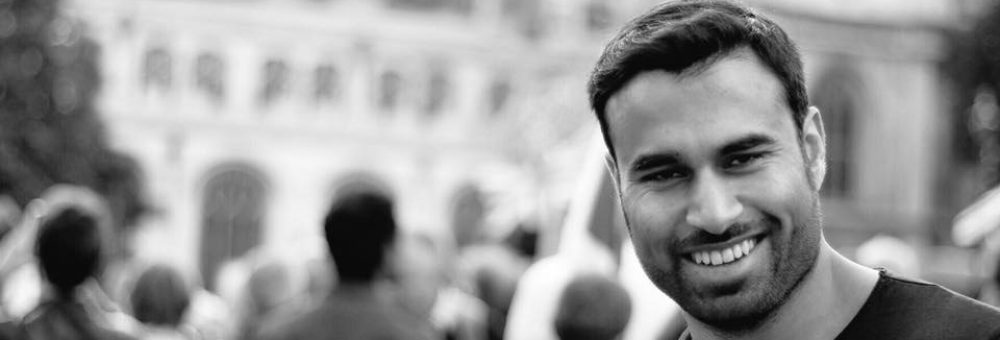‘It’s about improving my community, for my people, for Muslims, and mainstream society,’ says ‘Yes’ voter.

On the streets of southern Glasgow, independence posters in Urdu stare from windows, cars – prayer beads hanging from mirrors – beep their horns in support of “Yes,” and kids dribble footballs around women wearing brightly colored salwar kameez dresses.
The district of Pollokshields is “one of the most diverse areas in Scotland,” Scottish National Party Councillor Norman MacLeod proudly tells the Anadolu Agency as he stands on a terrace street corner while campaigning with other members of the country’s Asian population.
He’s dressed in a smart shirt and V-necked jumper, and is waving an ID card to let everyone know who he is. He has “Yes” stickers and “Yes” badges aplenty, and leaflets at the ready.
This area is predominantly South Asian, many of those who live nearby members of Scotland’s 77,000 Muslim population – of which Glasgow has 30,000. They are a minority in the country of more than 5 million, but when it comes to independence they want to make sure their voices are just as loud.
Campaigner Nighet Nasim is speaking to passers-by, stopping to tell AA that she wants to be “governed here in Scotland and not by Westminster [the home of the British parliament].”
“This is really about improving my community, for my people, for Muslims and mainstream society… we have this one chance to create something really positive,” she says.
Around us, grocery shops flog Asian spices, mannequins are adorned with Muslim dress and “Azadi [Freedom] for Scotland” is everywhere. Other than a few red Labour Party “No” posters, the purple and white of the anti-independence campaign is nowhere to be seen.
In the capital – around 40 miles down the M8 motorway – is the Edinburgh Central Mosque, which is surrounded by restaurants, take-aways and cafes. But walk into the Mosque restaurant itself and you’ll find that the majority of people are not even Muslim.
It could be that the food is cheap, that it’s so tasty – the lip-smackingly good sweet smell of chicken curry hangs in the air – but it’s more likely a sign of the level of integration of Muslims and how their food and culture has become a part of local society.
This view is reflected by Zahid Ali, who has been campaigning for “Yes.”
“I’m a Scotsman, Scotland is my home,” he tells AA, but then he no longer makes it about Scotland, he makes it about somewhere else.
“I think Scottish society is more accepting of Muslims,” he says. “As far as the Scottish community is concerned, it doesn’t matter if I’m Muslim or not… It [the independence referendum] is such a broad based issue that everybody is on board.”
He brings up Britain’s colonial legacy – the overseas possessions and trading posts established by England between the late 16th and early 18th centuries, particularly in Asia, which created the largest empire in history.
“I feel that Scotland is not tied into the colonial values of Britain. I see myself as less British and more Scottish,” he says. “There’s less blood on the Scottish flag than on the British.”
It’s a consensus that appears to be widespread in Edinburgh and Glasgow, and offers some explanation as to why so many Muslims, on both sides of the debate, have actively engaged in the politics of the referendum.
“If anything happens in regards to the Muslim community, First Minister Alex Salmond is ready to meet us at short notice,” says Ali. “He is ready to meet representatives of the Muslim community.”
Mariam Berrada is a 20-year-old student in Edinburgh who refers to herself as “Scottish Muslim.” She is also voting “Yes,” but switched from voting “No.”
“I was ‘No’ by default I think… but after hearing the arguments I changed my mind,” she told AA.
“I feel like British and Muslim are not compatible… I feel like British, it doesn’t really work well with ‘Muslim’,” she says, citing far-right groups such as the English Defence League and the British National Party. “We [Scots] are much more open minded.”
Mazhar Khan lives in Edinburgh. He says he’s undecided, but is leaning towards “yes,” Britain’s foreign policy a dominating factor.
“Westminster does not listen to Muslims when it comes to Iraq, Palestine or any other foreign policy issue,” he says. “In an independent Scotland I feel that we would have more of a say on foreign policy, and the SNP have already shown that they would speak out against Israel.”
In another working class area of Glasgow, AA caught up with the Scottish National Party’s Humza Yousaf.
Yousaf – a member of the Scottish Parliament since 2011 – says he believes that two thirds of the Muslim community is voting “Yes” – Britain’s foreign policy a major factor.
“In the last few years people have been able to see the juxtaposition and difference in approach from the Westminster government and the Scottish government, and that’s probably recently played out in the crisis in Gaza,” he added.
During this year’s blitz on the coastal territory by Israel, Edinburgh’s position was at odds with the U.K. Whereas London announced only a review of arms exports to Israel, Salmond called for an arms embargo – seen as evidence that a “yes” vote would free Scotland to choose a different foreign policy than as part of the U.K.
It’s not purely about foreign policy, though says Yousaf. There are other issues driving Scottish Muslims towards “Yes.”
“I think immigration is an issue, there’s a lot of anti-immigration and xenophobic rhetoric coming from London, driven by UKIP [the United Kingdom Independence party, which advocates pulling Britain out of the European Union and limiting the right of its citizens to enter], and instead of challenging those views the main political parties have been conforming to a lot,” he says.
“We have a different of approach to those issues… Plus the bread and butter issues, the economy, free education, all those things are quite important to the Muslim community,” he adds.
There are always those, though, whose focus is not so much on the short-term benefits, but what could happen in the long term if “Yes” does not lead to the prosperity that its campaign suggests.
Asif Osmani is a Professor at Edinburgh University. For him, talk of separation brings up memories and parallels with the partition of India and Pakistan.
“Nothing good will come of it, history tells us that… If the ‘Yes’ campaign wins, then the economy will be effected, and when that happens people will turn on the minorities, that means us… Muslims… It’s only natural that this will happen,” he says.
“Muslims voting ‘Yes’ is like turkeys voting for Christmas.”
He doesn’t even smile.
His wife, Saadia, a public relations consultant, agrees with him, but does not draw the same sub-continent parallels.
“It’s better to stay united… I’ve lived in England and I see us as the United Kingdom,” she says, adding that if the “Yes” campaign wins, she may think of moving back.
Read the original article published in Anadolu Agency on 17 September 2014
